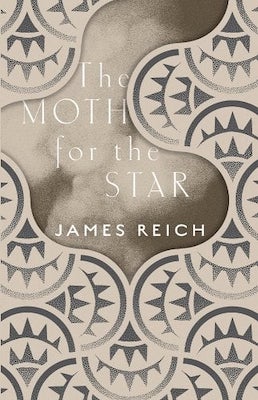
THE COSTUME PARTY to which Campbell and Varnas were invited was on the 9th floor, at the well-appointed home of the actor Milton Konigsberg, at 1 West Sixty-seventh Street. The sycamores and oaks of Central Park hissed in the breeze as they crossed, dressed in black leather coats, carrying their beak-like masks. Under the gargoyled limestone facade, Campbell turned to Varnas to kiss him. Then, looking carefully at the tall building, following the lines of the stone, she said, “I was right, Charles. Gargoyles have no place in America.” The blunt faces stared back, worn down with weather.
They reached Konigsberg’s door at 10 o’clock. Before they could ring the doorbell, it was opened by a waxy-skinned, red-haired young man dressed as an English butler with a white silk bow tie. With unfeigned deference, he presented each a glass of champagne from a silver tray and admitted them to the riot inside. Their drinks were each prepared with a thin paper straw. Konigsberg had instructed the young man in all things. Before announcing their names to the other guests as best he could above the cacophony, he should address each guest: “Enter freely. Go safely and leave something of the happiness you bring.” Almost as an afterthought, unpracticed at parties as he was, the butler offered them ivory cigarette holders engraved with the date. He cupped his right hand to the side of his mouth like a megaphone and announced them, “Ms. Campbell and Mr. Varnas!”
Although she had not visited in a year, Campbell knew the tall, five-room suite well, the actor having been a friend of her father. All of the homes in the building were opulent, imitation gothic, like movie sets with grotesque chandeliers and yawning fireplaces. Konigsberg’s place was filled with a miasma of cigarette smoke and ecstatic noise. Campbell turned to Varnas, lifting her glass. “Drinking straws,” she laughed. “My God, Milton thinks of everything.” A figure Campbell intuited to be a disguised Milton Konigsberg drifted toward them through the torrid chandelier and candlelight. The chandelier had a thin cord dangling from it, and the butler’s pulling on this would keep it swinging slightly all night.
Milton Konigsberg was dressed as all of the invited guests had been instructed—and as Campbell and Varnas were—as a plague doctor in a long leather coat that skimmed the floor, a white beak mask with inset eye lenses like the tinted goggles of an arctic explorer, and a broad-brimmed sable hat. Konigsberg had told Campbell that the Crash was like a modern Biblical plague, and something must be done to drive it out. “The rivers are blood,” he had said with melodrama, “and the first-born are dying. Soon we’ll have nothing to eat but the locusts.” Several uninvited guests had arrived as witches, harlequins, Mayans, pirates, and chimeric animals. They could be of no assistance in this ritual.
Varnas’ raven-black mask stood out among all the white versions. In a leather-gloved hand, he raised his champagne glass and slipped the paper straw into one of the two breathing holes on the underside of his beak. Campbell watched his champagne vanish into it. Among the countless plague doctors, it was like being lost in a mad flock of birds. Konigsberg leaned between them, lifting his mask a fraction to greet them and to conspire. “Say, don’t let on or everyone will demand one, but there’s a small sponge soaked in laudanum in the tip of my beak.” Konigsberg laughed, the drug bending him at the waist. Then, he stood straight, gathered himself, and spoke loudly above a skipping jazz record. “How are you Campbell? Delightful to see you, Charles! So glad you could make it!”
“Thank you, Milton,” Varnas said. “This is really something!”
“I invited precisely one hundred friends. All were to wear the same costume style, but as you can see from the misfits in the wrong garb, there must be one hundred and thirty in here by now, but who cares? Say, test out your drinking straw, Campbell! They have a wax coating that’ll preserve the paper for about an hour. But for God’s sake,” he laughed again, “don’t drink that slowly!”
“Ingenious!” Campbell said.
The main room with its staircase to the library was a parliament of beaked figures in heavy black coats. “It’s like a plague convention,” Varnas said. The effect was overwhelming.
Campbell was delighted. “I adore it, Milton.” She tilted her head back to watch the sway of the chandelier overhead, the frosty aurora it cast against the ceiling and the walls.
“Let me show you where everything is,” Konigsberg offered. “And by everything I mean the bar.”
Varnas clapped him warmly upon his leather shoulder. “Let’s go.”
Campbell whooped and took Varnas’ hand as they made their way through the tight, Black Death coils of the party.
“Here it is.” Briefly lifting his mask again, the better to be understood, Konigsberg indicated the hatch of a dumb waiter in his cramped kitchen. “Ring the bell once and cocktails come up. Ring twice, and you can use this notepad to write any requests to send down. Sometimes, there’s even food that arrives. Help yourselves or let the help bring it around, it’s all the same to me. You can send empty glasses back down, too.” Konigsberg was manic. “Oh, God, I shouldn’t have even suggested that. Please don’t feel compelled to do that. Everything will get cleaned up, eventually. It’s pretty quick. Let’s check on that music, anyhow.”
They went with him. The gramophone was to the right of the fireplace, where a flock of plague doctors had assembled to peck at the silver-framed publicity photographs and playbills on the mantel. “Ah, this is my new favorite,” Konigsberg crooned, his voice eerily distant in his laudanum beak. He adjusted the needle. “Louis Armstrong. ‘Body and Soul.’ It’s brand new.”
“I like it,” Campbell said, swaying in her heavy coat, ivory beak, and black hat. She had finished her champagne, and taken up a martini, with a new paper straw. “This is a terrific party, Charles. I think we needed it!”
Milton Konigsberg bowed and retreated toward the door where more shadowy figures surrounded the red-haired butler like carrion birds.
Varnas took up a martini of his own, again pushing its straw into his breathing hole. “This is great, but I think if I try to smoke in this mask, I’ll drop dead and ruin everything.” He wrapped his arm around Campbell’s hips, and their beaks chapped together.
“Here,” she said. “Did you see this?”
“What is it?”
“He framed it, the gruesome devil! Then again, I think I might, too, if I lived here.” Campbell handed Varnas a section of newsprint behind glass, set in a silver frame.
He read the headline aloud. “COUPLE SHOT DEAD IN ARTISTS’ HOTEL. SUICIDE COMPACT IS INDICATED BETWEEN HENRY GREW CROSBY AND HARVARD MAN’S WIFE.” Sipping his martini, he continued, “Henry Grew Crosby, 32 years old, of a socially prominent Boston family, and Mrs. Josephine Rotch Bigelow, 22 years old, the wife of Albert S. Bigelow, a post-graduate student at Harvard, were found dead about 10 o’clock last night—” Someone, doubtless Konigsberg, had scrawled a date in blue ink across part of the line but motive is unknown. It was dated December 11th, 1929. He had also annotated it to record that it came from The New York Times. “—each with a bullet wound in the head, in the studio apartment of Crosby’s friend, Stanley Mortimer Jr., a portrait painter on the ninth floor of the Hotel Des Artistes, 1 West Sixty-seventh Street. The couple died in what Dr. Charles Norris, Medical Examiner, described as a suicide compact. The police believe that Crosby, in whose hand they found a .25 Belgian automatic pistol, had shot Mrs. Bigelow and then turned the weapon on himself…was described as a poet…nephew of J.P. Morgan…”
“Do you think Mortimer is here?”
“God, I hope not. Not with this thing on display.”
“What possessed them? Or him, really. I remember it, from the news, but I forgot it happened here. The cops broke the door down with an axe.” Regardless of the truth, Campbell reasoned, the dead couple were on that side of the Crash ledger that could call them its casualties. The music picked up and several of the guests began dancing.
“Immortality—” Varnas voice was muted in the weird beak mask.
“What?”
“It doesn’t matter. Let’s find a bite, okay?”
***
Campbell could not have said when she lost Charles Varnas in the crowd that churned in Milton Konigsberg’s large living room with its tall starlit windows and tilting chandelier, but when she looked back over her polished leather shoulder, she did not see his odd, black mask, only the mass of white beaks, and someone dressed as a mummified corpse in worm-eaten bandages, an imitation policeman, and a middle-aged vampire with white-streaked hair and a red-lined cape among the intimate conspiracies of drunken plague doctors. There was a second gramophone in the room now and the two struggled discordantly like alien plants, howling metallically. She called his name and repeated it. For a moment, she thought she noticed him, close to a woman in a green dress who had fixed rubber snakes in her hair with fishing line. Campbell grew afraid. She needed Varnas to protect her from the presence that had visited her the night before. It was almost too much. The strain of repressing it left her nerves thin—A glimpse of a grinning tanned face under black plastic sunglasses and a ratty red fez, pale linen shoulder turning aside—
Then, he was there. “Campbell, are you okay?”
She embraced him. “Charles! I want to leave. Is that all right with you? I don’t want to be a bore.”
Varnas laughed. He glanced cynically at what he suspected were other couples who appeared exhausted but determined to last the party out. “Of course,” he said, a little drunk. “It’s not like we paid a babysitter.” He lifted their wooden beaks and kissed her. “Sure, sure. Screw it. Out, out. We can go in just a moment.” Varnas searched frantically for a last martini to drink on the way through the crowd to the exit. He intercepted the red-haired young man who was passing delicately toward two plague doctors and a dismal satin Pierrot whose ruff was stained with red wine, as though tuberculosis had struck the clown some time earlier that evening. Tossing the straw and the olive aside, he lifted his mask and drank the gin in two fierce, relieved swallows.
Without speaking of it, they intuited that neither felt the need to seek out Konigsberg to make their excuses. Varnas was pleased to be able to slip away without more straining to be heard. The alcohol was pleasant in him. It made him feel that all things were possible. He felt relaxed and powerful.
Hesitating in the hallway, Campbell and Varnas examined the closed doors of the other suites for indications of repair after the policeman’s axe, or any entrance that appeared incongruous and new. Standing outside it, the party was still terribly loud. Campbell went from door to door, like an unquiet specter. Varnas shrugged. There was no longer any sign of the doomed couple’s suicide pact. Campbell was disappointed.
__________________________________
Excerpt from James Reich The Moth for the Star (7.13 Books, September 12th, 2023).


